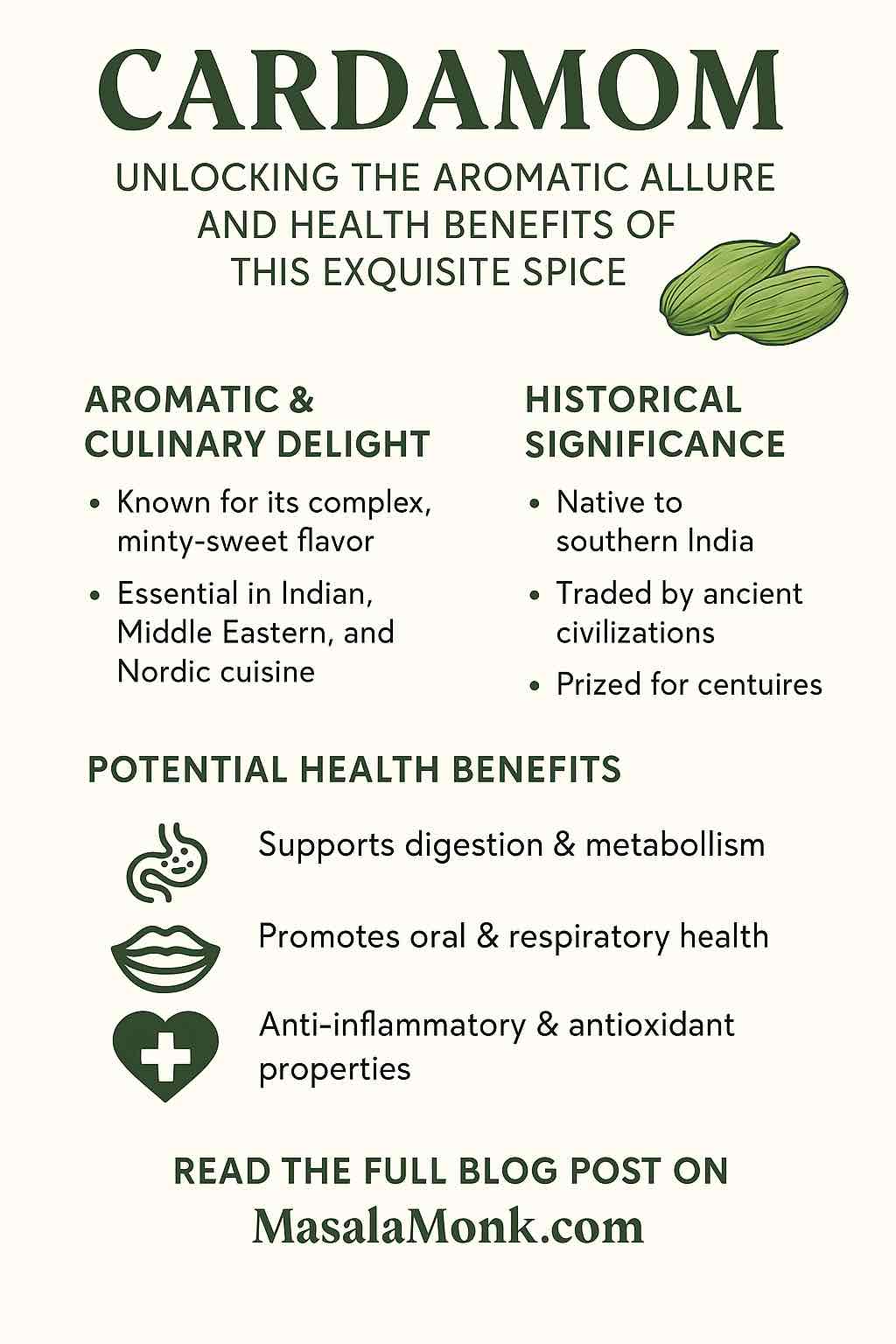
A deep dive into the Queen of Spices, from ancient traditions to cutting-edge science—and how to make it part of your everyday life.
🌿 A Whiff of Wonder: What Makes Cardamom So Special?
Take a deep breath. That sharp, sweet, floral aroma you just imagined? That’s cardamom.
Often referred to as the Queen of Spices, cardamom is a tiny pod that packs a powerful punch. Known for its unique fragrance—a blend of mint, citrus, and warm spice—it’s been cherished for thousands of years, not only in the kitchens of India and the Middle East but also in ancient medical systems like Ayurveda and Traditional Chinese Medicine.
But what makes this small pod so intriguing is that it’s more than just flavor. Modern science is finally catching up with traditional wisdom, revealing cardamom’s impressive range of health-supporting benefits—from metabolic support to antimicrobial action.
🧭 A Journey Through Time: Cardamom’s Storied Past
Cardamom’s origin traces back to the lush rainforests of the Western Ghats in southern India, where wild varieties still grow today. It was a prized commodity in ancient Greek and Roman trade routes, and later became a mainstay of Arabian perfumery and Indian medicine.
By the 20th century, cardamom cultivation had spread to Guatemala, now the largest exporter globally. Yet it’s still Alleppey Green Cardamom, grown in Kerala, India, that holds Geographical Indication (GI) status for its quality and aroma.
🔬 The Science Behind the Spice: Health Benefits of Cardamom
Cardamom isn’t just delicious—it’s a phytochemical powerhouse. Let’s break down the research by benefit area:
1. ❤️ Cardiovascular and Metabolic Health
Recent trials show:
- Improved lipid profiles – Lower triglycerides, higher HDL cholesterol
- Inflammation reduction – Decreased CRP and IL-6 levels, especially in individuals with metabolic syndrome and PCOS
- Possible blood pressure-lowering effects, though evidence is mixed
✅ Tip: In studies, doses of 1.5–3g/day of cardamom powder showed the most benefits. That’s roughly 1 teaspoon.
2. 🧘 Digestive & Gut Health
Traditional use meets science here:
- Stimulates bile production, aiding digestion
- Reduces bloating, gas, and indigestion
- Its essential oils (e.g., cineole) exhibit antimicrobial effects against common gut pathogens
✅ Practical Use: Steep a few crushed pods in hot water after a meal for a calming digestive tea.
3. 🦷 Oral & Respiratory Health
Chewing cardamom pods isn’t just an old habit—it’s effective:
- Fights oral bacteria, improves breath
- Soothes the throat and respiratory tract
- Used in traditional remedies for cough and congestion
✅ Try This: Add cardamom to warm water with honey for sore throat relief.
4. 🧠 Mental Clarity & Emotional Balance
Cardamom is used in aromatherapy for:
- Mood enhancement and stress relief
- Mild anxiolytic effects in herbal preparations
- Its aroma may stimulate dopaminergic pathways (still under study)
✅ Use It Like This: Add 1 drop of cardamom essential oil to a diffuser, or mix with a carrier oil for calming massage.
5. ⚖️ Weight and Metabolic Regulation
Animal studies (2023) suggest:
- Cardamom increases energy expenditure
- Reduces fat accumulation
- May modulate neuroendocrine metabolism
🚨 But: Human trials are early-stage and inconclusive. Think of cardamom as a supportive agent, not a miracle fix.
🍽️ How to Use Cardamom in Everyday Life
| Form | Uses |
|---|---|
| Whole pods | Infuse in rice, tea, stews, or desserts (crack before using) |
| Ground powder | Sprinkle into oatmeal, coffee, smoothies, or baking mixes |
| Essential oil | Use in aromatherapy or dilute for skin application |
| Tinctures/Capsules | Used in clinical settings or herbal protocols (consult a professional) |
🔄 Easy Ways to Add It to Your Day
- Add a pinch to your morning coffee or chai
- Mix into granola or yogurt for a warm, spicy note
- Include it in homemade spice blends (garam masala, pumpkin spice)
- Brew cardamom tea with ginger and cinnamon
🛑 Safety and Side Notes
- Safe in culinary amounts – Few side effects unless consumed in high doses
- Pregnancy caution – Avoid therapeutic doses unless advised
- Drug interaction – May interact with anticoagulants; check with your doctor if on medications
📚 Final Thoughts: Cardamom as a Daily Ally
Cardamom is a beautiful example of a spice that bridges pleasure and wellness. Whether you’re savoring its scent in Nordic pastries, its zing in Middle Eastern coffee, or its comforting hug in a cup of chai, you’re also receiving a bouquet of plant-based wellness compounds.
While modern medicine continues to explore its depths, cardamom remains a trusted favorite in kitchens and medicine cabinets alike.
💡 Want to Try? Start Here:
3-Day Cardamom Ritual Challenge:
- Day 1: Add it to your tea or coffee
- Day 2: Use it in your cooking (e.g., rice, lentils, or soup)
- Day 3: Try it as a digestive tea after dinner
Let your senses lead the way—this spice is as healing to the spirit as it is to the body.
📘 Frequently Asked Questions (FAQs)
1. What is the difference between green and black cardamom?
Green cardamom (Elettaria cardamomum) has a sweet, floral, and citrusy flavor, ideal for desserts and drinks.
Black cardamom (Amomum subulatum) has a smoky, earthy flavor, used in savory dishes like curries and stews.
2. How much cardamom should I consume daily for health benefits?
Most clinical studies used 1.5–3 grams/day of ground cardamom (roughly ½–1 teaspoon). This is safe for most people when consumed as part of food.
3. Can cardamom help with weight loss?
Animal studies suggest that cardamom may increase fat metabolism and energy expenditure, but human studies are still early. It may support weight goals when combined with diet and exercise.
4. Is cardamom safe during pregnancy?
Yes, in culinary amounts. However, avoid concentrated extracts or supplements unless prescribed, as safety data is limited.
5. Can I chew cardamom pods directly?
Yes. Chewing cardamom pods freshens breath, supports digestion, and may help oral health due to its antibacterial compounds.
6. How do I store cardamom to preserve its aroma and potency?
Keep it in an airtight container in a cool, dark, dry place. Whole pods last longer than ground powder.
7. Does cardamom interact with medications?
Possibly. Cardamom may enhance blood-thinning effects or interfere with certain medications. Consult a healthcare provider if you’re on prescription drugs.
8. Can I use cardamom in coffee or smoothies?
Absolutely! Add a pinch of cardamom powder to coffee, lattes, or smoothies for a flavorful and healthful twist.
9. Are there any side effects of eating too much cardamom?
High doses (above 5g/day) may cause mild nausea, dry mouth, or allergic reactions in sensitive individuals. Stick to culinary or moderate therapeutic amounts.
10. Is there scientific proof that cardamom helps with inflammation or cholesterol?
Yes—multiple human trials have shown that cardamom reduces inflammatory markers and improves HDL/triglyceride ratios, especially in those with metabolic disorders.












